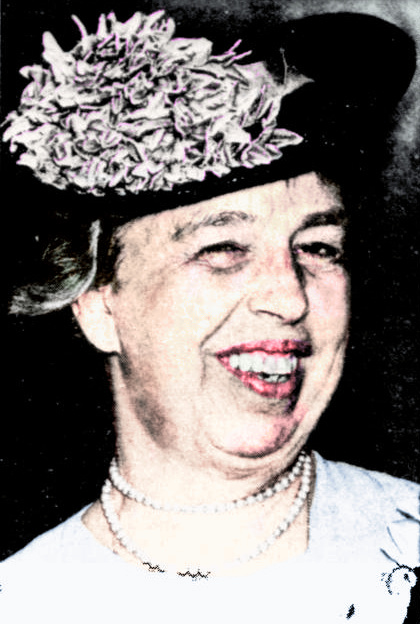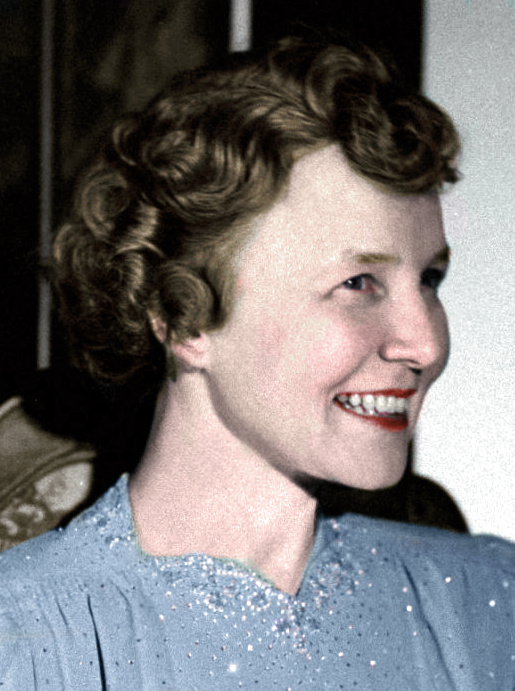The Pittsburgh Press (October 28, 1940)

Says Fannie Hurst…
MISTRESS OF WHITE HOUSE MUST BE MORE THAN JUST A GRACIOUS LADY
…
Mrs. Roosevelt Is Given Vote of Writer
…
What sort of “First Lady” do Americans want in the White House! Fannie Hurst, famous author and playwright, thinks she must be a person of initiative and action in the national scene. In the article below, Miss Hurst casts her vote for Mrs. Roosevelt. Rita Weiman, popular writer, disagrees. Tomorrow, Miss Weiman will present the case for Mrs. Wendell Willkie.
…
By Fannie Hurst

Eight years ago a long and shuddering gasp shook this country from coast-to-coast.
What-ho! A personality instead of a housewife in the White House! What have we here?
Then, with one gargantuan impulse, the composite tongue of the nation vegan to wag:
The First Lady’s place is in the White House. What’s the big idea. the wife of the President of the United States interesting herself in the United States? Why doesn’t Mrs. Roosevelt stay at home?
“Stop her,” cried the ladies of the land, who behaved as if London Bridge were falling down. “The First Lady’s place is in the White House, seeing to it that the guests don’t steal napkins; entertaining cabinet wives and visitors from Duluth; deciding the color scheme of guest soap; and joining the Easter Egg Romp on the lawn.”
Shades-of-the-Gentle-First-Ladies-of-Administrations-Gone-By, what have we here? As a matter of fact, we have a First Lady who immediately solved the problem of guests stealing napkins by substituting linen that did not bear the White House insignia. We have here a First Lady who does pass on the color scheme of guest soap; who entertains visiting ladies from Duluth on a frequency scale that has probably never been practiced before, and whose Easter Egg activities are second to none for zest and conformity.
Nevertheless, that long shuddering gasp of eight years ago, which, it is true, has now subsided into a coast-to-coast purr, was real and disturbing to the American people.
Now, what has this personality-plus, whose interests range from bathroom curtains top affairs of empire, done to the tradition of First Ladies of our land?
Mr. and Mrs. Man-in-the-Street, take it and like it, (and I believe you do), she has smashed it to smithereens.
This is not to say that there will not, in the future, be First Ladies who will resort to the easy atavism of slipping back into just the role of gracious lady.
Inevitably those to follow in her illustrious shadow will be destined to the odiousness of comparison. Down through the pleasant corridors of the White House on Pennsylvania Avenue will roll long reverberations of the name of the woman who, with reverence and humility, did many things because they “had been done,” and with courage and initiative, did many things because they had not been done.
“That dates back to the Eleanor Roosevelt,” or “Eleanor Roosevelt was the first one to do that,” will be colloquial phrases on the tongues of generations of First Ladies to come.
So should they be grateful phrases on the tongues of a progeny that stands fair to profit because back here in the troubled years between 1932 and 1940, a personality who was housewife, humanitarian, gracious lady, pathfinder; who was a many-faceted human being, dared to let her intelligent interests range from bathroom curtains to yogi, to social security, to wife and motherhood, to folk dances, to baby formulae, to housing, to coal miners, to equal suffrage, to peace, to rich men, poor men, beggar men, thieves, doctors, lawyers, merchants, chiefs; to ivory, apes, peacocks, sealing wax, airships, democracy, babies, spoon-bread, higher education, knitting, domestic service, adult education and grandchildren.
The present First Lady isn’t a “fine hand” in affairs of state, or in that circuitous exercises of feminine influence as we know it to exist in European politics. She is as forthright as a lad, more intelligent than intellectual, does things for simple, uncomplicated reasons such as the greatest good for the greater number.
When she errs, her mistakes are built on solid gold impulses and her successes outnumber them overwhelmingly.
This is a Lady hard to beast. Her successors, whether they are to be disturbed by it or not, are never going to be allowed to forget that in 1932, she walked into the White House, put it in order, kept it in order, and did one of the most astonishing side jobs in the history of First Ladies, or for that matter, in the history of American ladies.
She would not recognize intrigue if she met one on the street. Her basic motives are uncomplicated. She likes hot dogs for the pleasant democratic reason that she is like that.
The chances are she has never thought much one way or another about this housewife or personality business.
She happens to be both, and that’s just one reason why I am voting her a third term.
TOMORROW – Rita Weiman presents Mrs. Wendell Willkie.
